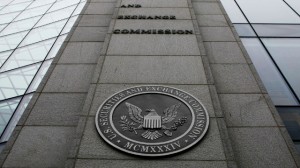
In this file photo made Dec. 17, 2008, shows the exterior of the Securities and Exchange Commission (SEC) headquarters in Washington. (AP Photo/File)
This post originally appeared at ThinkProgress.
A petition to the Securities and Exchange Commission to require more sunlight around corporate political spending has garnered hundreds of thousands of public comments, and almost all of them are in support of the rule change. Of the 643,599 public comments on the proposal to require that public companies disclose use of corporate resources for political activities to shareholders, more than 99.7 percent were in support of such a rule.
Since the Supreme Court’s 5 to 4 Citizens United ruling in 2010, corporations have been free to spend as much money as they want on independent expenditures in support of or opposition to political candidates. While some of these expenditures are subject to existing disclosure rules, many keep their spending hidden by funneling the money through tax-exempt groups like the U.S. Chamber of Commerce, Karl Rove’s Crossroads GPS, the Koch Brothers’ Americans for Prosperity, and Pat Boone’s 60 Plus Association. Legislation to require meaningful disclosure of who is really behind these ads has been blocked by Congressional Republicans since 2010.
Supporters of transparency have urged the SEC to use its rule-making authority to solve part of the problem. In 2011, ten professors of law petitioned to the Commission, urging it to require public companies to disclose all significant political spending so shareholders can hold their companies accountable.
Since, the agency has received hundreds of thousands of comments. Felicia Kung, chief of the SEC’s Office of Rulemaking, said last week that the proposal has “garnered more comments than even our most controversial rules, which is saying a lot these days.” Mary Boyle, vice president for communications at Common Cause, tweeted that the total was the “most ever.”
Take Action
If you support this new rule, sign the petition or send in your own comment to the SEC.
While more than 641,800 of the comments were in support of the rule, several tax-exempt political groups that do not disclose their contributors wrote in opposition, calling the proposed rule “wholly unsupportable as a matter of policy,” “far outside the Commission’s legal authority,” and “plainly” in violation the First Amendment. These opponents included the U.S. Chamber of Commerce, the 60 Plus Association, the National Association of Manufacturers.


